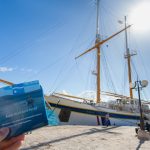Putting the environment first on Mljet!
As Dubrovacki Dnevnik reports on the 17th of September, 2017, Greenpeace’s volunteers participated in the cleaning up of Grabova beach in National Park Mljet, which has been particularly vulnerable to plastic waste. Their aim is to point out the alarming levels of pollution in the Adriatic sea owing to plastic and to call upon the companies that put large quantities of disposable plastic on the market to take responsibility for their actions.
In cooperation with the Island Movement (Pokret Otoka), Greenpeace has organised cleanup actions on Mljet, Brač, Pag, Solta and in Split. In addition to the act of cleaning itself, a plastic waste review will also be carried out in order to determine which companies hold the most responsibility for the pollution and the absurd quantities of disposable plastic in the sea. Aside from here in Croatia, cleanup actions and surveys of collected waste are also being organised and undertaken in other countries, including Spain, France, Indonesia and the Philippines.
“Cleaning the beach is necessary to repair the damage that has already been done, but it is seismic if we don’t reduce our use of plastic. This battle on the Adriatic beaches has lasted for years, but despite the extraordinary efforts of locals and volunteers, it seems that we’re slowly losing this race with time, and it is visible on Grabova beach where we came across a disturbing sight,” stated Mihaela Bogeljic, Head of the Greenpeace campaign.
Aside from the negative effects plastic has on the environment that we’re all already more than well aware of, many sea creatures, often already endangered ones, suffer and die unnecessarily owing to plastic being thoughtlessly dumped or discarded in the sea and on beaches.
Scientists estimate that an extremely worrying 1,455 tons of plastic is floating around the Mediterranean sea, making the Mediterranean one of the most endangered seas, and that is why the battle against plastic has also been taken up by the popular Island Movement.
“Such actions (beach and sea cleanups) are needed because it is extremely important to awaken the awareness of every individual within the [local] community, especially the inhabitants of coastal areas, as well as their guests, about the importance of environmental concerns, the reduction of plastic waste and the regular cleaning of the affected areas. With the manufacturing and use of plastic we’re harming the sea and all the living creatures in it that could potentially end up on our tables. When we think about it, we’ll eat our own waste. It is time to understand that only by us taking responsibility, and by continuously educating and encouraging individual actions can we make such a necessary change. Who will, if not us?” said Maja Jurišić, leader of the Island Movement Initiative.
Greenpeace calls upon citizens to sign a petition against disposable plastic. With this campaign, Greenpeace want to influence European legislation with the aim of taking effective measures to counteract plastic pollution.
Since its arrival in the Republic of Croatia, Greenpeace has run campaigns for sustainable fisheries, against TE Plomin C, and against the exploitation of oil from the Adriatic Sea with the ”SOS for the Adriatic” initiative and the use of renewable energy sources. During a recent solar tour of Istria, Greenpeace has launched a campaign to promote renewable sources in tourism, with the emphasis placed heavily on using solar energy in the Adriatic. Since this year, the respected organisation has been campaigning against disposable plastic.









